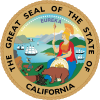| Brown Act | |
|---|---|
 | |
| California State Legislature | |
| Full name | An act to add Chapter 9, comprising Sections 54950 to 54958, inclusive, to Part 1, Division 2, Title 5, of the Government Code, relating to meetings of legislative bodies of local agencies. |
| Signed into law | July 2, 1953 |
| Sponsor(s) | Ralph M. Brown |
| Governor | Earl Warren |
| Code | California Government Code |
| Bill | AB 339 |
Status: Current legislation | |
The Ralph M. Brown Act is a California law that guarantees the public's right to attend and participate in meetings of local legislative bodies. Located at California Government Code 54950 et seq., it is an act of the California State Legislature, authored by Assemblymember Ralph M. Brown and passed in 1953.[1]
The Brown Act was enacted in response to mounting public concerns over informal, undisclosed meetings held by local elected officials. City councils, county boards, and other local government bodies were avoiding public scrutiny by holding secret "workshops" and "study sessions." The Brown Act applies to “local agencies,” meaning a county, city, whether general law or chartered, city and county, town, school district, municipal corporation, district, political subdivision, or any board, commission or agency thereof, or other local public agency. The Act has been interpreted to apply to email communication as well, leading to restrictions on the number of parties that can be copied on electronic messages.[2] The comparable Bagley-Keene Act mandates open meetings for State government agencies.
- ^ Lockyer, Bill (2003), The Brown Act: Open Meetings for Local Legislative Bodies (PDF), vol. Foreword, Introduction, and Table of Contents, California Attorney General, archived from the original (PDF) on 2009-05-01, retrieved 2009-06-27
- ^ "The Brown Act and the Perils of Electronic Communication". westerncity.com. 2011-06-01. Retrieved 2016-11-16.
